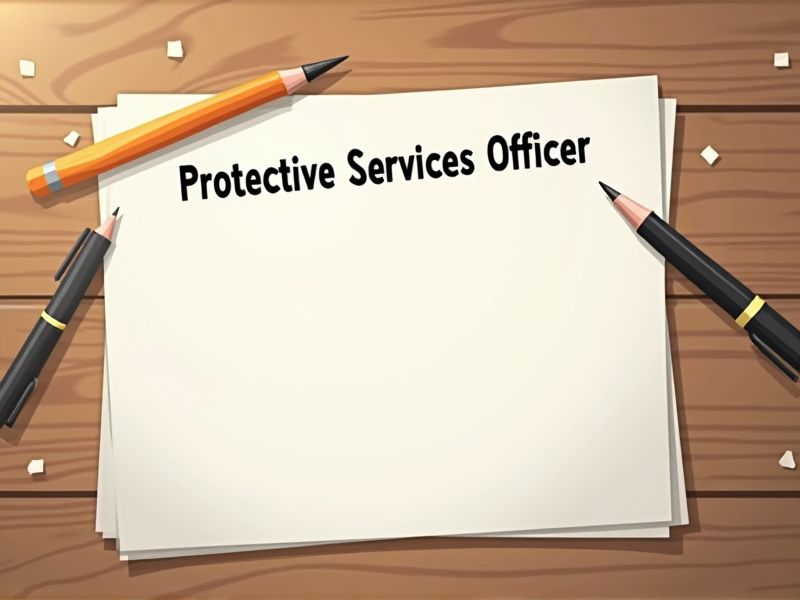
Protective Services Officers play a crucial role in ensuring public safety and must have a strong knowledge base to handle various challenging situations effectively. Certifications verify their skills and provide a standardized measure for evaluating their competence and readiness. Having specific certifications helps maintain a high level of trust and professionalism within the field. Here are some important certifications Protective Services Officers may need.
Peace Officer Standards and Training (POST) Certification
POST Certification ensures uniform standards for training, professionalism, and competency among Protective Services Officers, leading to improved public trust. It provides necessary skills and knowledge that enhance the officer's ability to perform their duties safely and effectively. Certification enforces accountability, reducing the risk of misconduct and misuse of authority. Compliance with these standards can lead to better crisis management and conflict resolution in community interactions.
Use of Force Certification
A Use of Force Certification ensures that Protective Services Officers understand legal and ethical boundaries, reducing liability for themselves and their employer. This certification provides standardized training, which increases consistency in response during high-pressure situations. Officers with this certification are better equipped to handle conflicts without escalating violence. The certification enhances public trust by demonstrating accountability and commitment to professional standards.
Firearms Proficiency Certification
Firearms Proficiency Certification ensures that Protective Services Officers can handle weapons safely, reducing the risk of accidental discharge. It enhances officers' ability to respond effectively in high-threat environments, thereby safeguarding both the public and themselves. Certification provides a standardized measure of competence, contributing to unified training standards across jurisdictions. Knowledge and skill in firearms handling bolster public trust in the officers' capability to manage critical situations.
Defensive Tactics Certification
Defensive Tactics Certification equips Protective Services Officers with essential skills to effectively manage and neutralize potential threats, enhancing their ability to maintain public safety. Without proper training, officers risk responding inadequately to volatile situations, which can jeopardize their safety and that of the public. Certification ensures officers are updated on current best practices and legal standards, reducing liability and promoting professional accountability. The certification process also fosters a deeper understanding of ethical considerations during confrontations, supporting officers in making informed, split-second decisions.
Emergency Vehicle Operator Course (EVOC) Certification
Emergency Vehicle Operator Course (EVOC) Certification is needed for Protective Services Officers to enhance their driving skills and ensure safe and effective operation of emergency vehicles under high-stress situations. It imparts knowledge on vehicle dynamics and control, crucial for quick and safe responses during emergencies. The certification reduces the risk of accidents and liabilities as officers have proven competencies in handling emergency driving scenarios. Officers' ability to make split-second decisions in evasive and pursuit driving improves, fostering public safety and officer well-being.
Crisis Intervention Training (CIT) Certification
Protective Services Officers often encounter situations requiring immediate mental health intervention, and Crisis Intervention Training (CIT) equips them with essential skills to effectively manage these incidents. The certification helps officers reduce the risk of escalation, leading to safer outcomes for both individuals experiencing a crisis and the officers themselves. Data indicate that CIT-trained officers show increased empathy and understanding toward individuals with mental health issues, which can enhance community relations and trust. Completing CIT certification often results in a lower incidence of use-of-force complaints, reflecting improved incident resolution strategies.
CPR/First Aid Certification
Protective Services Officers frequently encounter emergencies where immediate response can save lives; CPR/First Aid certification equips them with the necessary skills to handle such situations effectively. Accidents or health crises can occur during their duties, and being certified ensures they are prepared to provide essential care until medical professionals arrive. Employers often require this certification to ensure their team is capable of mitigating potential liabilities and enhancing overall safety. Certification also demonstrates a commitment to the well-being of others, reinforcing trust and reliability in their role.
Active Shooter Response Certification
Protective Services Officers encountering active shooter situations often require specialized training, enhancing their ability to respond effectively and ensure public safety. Active Shooter Response Certification provides these officers with a standardized approach to handling such volatile scenarios, minimizing chaos and potential casualties. The certification hones skills in threat assessment and strategic response, allowing officers to make split-second decisions that could save lives. This training builds confidence in officers, reinforcing their capability to act swiftly and decisively during critical incidents.
Incident Command System (ICS) Certification
Incident Command System (ICS) Certification equips Protective Services Officers with standardized emergency response protocols, enhancing their ability to manage crises effectively. The certification fosters interagency coordination, crucial for seamless collaboration during multi-jurisdictional emergencies. It also ensures officers understand their roles and responsibilities, preventing operational confusion. This training improves readiness and adaptability, critical under evolving threat landscapes.
Legal and Ethical Practices in Protective Services Certification
The certification ensures that protective services officers understand and adhere to legal standards, reducing the risk of liability for misconduct. It fosters ethical decision-making, which enhances public trust and confidence in the service provided by these officers. Rigorous training in legal and ethical practices equips officers with the skills to handle complex scenarios with integrity. This certification also aligns officers with national and state regulations, ensuring consistent and reliable service across various jurisdictions.
Summary
When you pursue certifications as a Protective Services Officer, your professional skills and credibility enhance significantly. This results in increased opportunities for career advancement and access to more specialized roles. Employers recognize your commitment to continuous learning and value your expertise in managing safety and security challenges. Certified officers often experience higher job satisfaction due to enriched responsibilities and confidence in their capabilities.
